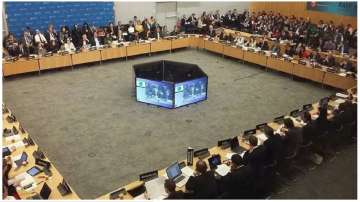FATF review of India's anti-money laundering & terror financing regime pushed to 2021
The much-awaited Financial Action Task Force (FATF) mutual evaluation of India's anti-money laundering regime and legal measures framed to check financial crimes, scheduled for this year, has been postponed till early next year in view of the coronavirus pandemic.

The much-awaited Financial Action Task Force (FATF) mutual evaluation of India's anti-money laundering regime and legal measures framed to check financial crimes, scheduled for this year, has been postponed till early next year in view of the coronavirus pandemic, officials said.
They said the on-site review to be conducted by experts of the global body was scheduled to begin in September-October but the FATF secretariat in Paris has conveyed to India that the review is being tentatively pushed to January-February next year.
The FATF is a global money laundering and terrorist financing watchdog that sets international standards to prevent illegal activities in the economic and financial channels of a country and its inter-connected linkages across the world.
It conducts "peer reviews of each member on an ongoing basis to assess levels of implementation of the FATF recommendations and provides an in-depth description and analysis of each country's system for preventing criminal abuse of the financial system."
The review of India's anti-money laundering and terrorist financing regime was scheduled for this year as part of a regular review cycle after 10 years. The last such review was done in June 2010, a senior officer in an anti-money laundering agency said.
The FATF, post this review, had said in 2013 that "India had made significant progress in addressing deficiencies identified in its mutual evaluation report and (the FATF) decided that the country should be removed from the regular follow-up process."
India has set up a joint working group comprising 22 central investigation, intelligence gathering and regulatory agencies to make presentations and brief the FATF experts, drawn from various countries, this time.
Some of the prominent agencies in this grouping supervised by the Department of Revenue under the finance ministry include the CBI, ED, Income Tax Department, Directorate of Revenue Intelligence, Financial Intelligence Unit (FIU), Customs, market regulator SEBI, banking regulator RBI and insurance regulator IRDAI.
The Union government had also deputed Rahul Navin, a 1993-batch Indian Revenue Service officer of the Income Tax Department, to work as an officer on special duty (OSD) with the Enforcement Directorate (ED) to take these processes forward.
Navin has authored a book, 'Information Exchange and Tax Transparency: Tackling Global Tax Evasion and Avoidance', and served in the international taxation wing of the tax department and worked closely with the OECD, another reputed global economic body.
The ED is the nodal agency to undertake investigations under the Prevention of Money Laundering Act (PMLA) in the country.
A senior Union finance ministry official said all preparations to brief the FATF reviewing group were nearing completion when the COVID-19 outbreak happened.
"We have been informed by the FATF that it has postponed the mutual evaluation of many jurisdictions scheduled this year including that of India due to the ongoing COVID-19 restrictions. It is expected that the new dates will be for early next year," the officer told PTI.
The FATF too made a public declaration in this context.
"The gravity of the COVID-19 situation globally and the consequent COVID-19 related measures that countries have adopted, such as confinement and travel restrictions, are making it impossible for assessed jurisdictions and assessors alike to conduct on-site visits and in-person meetings. This situation has significantly impacted countries' ability to actively participate in mutual evaluation and related follow-up processes."
"The FATF Plenary has therefore agreed to temporarily postpone all remaining FATF mutual evaluations and follow-up deadlines," the FATF said.
It said India's possible on-site period is "tbc (to be considered)".
During the visit of FATF evaluators, the finance ministry officer said, India has prepared to present multiple dossiers of the action undertaken by it under the anti-money laundering law, criminal tax evasion probes and for strengthening the CFT (combating financing of terrorism) regime by the financial intelligence unit (FIU) and other agencies.
The enactment of the Fugitive Economic Offenders Act in 2018, the anti-black money Act of 2015, amendments brought in the PMLA over the years, curbing tax evasion under indirect taxes by bringing in the GST (goods and services tax), new protocols to better regulate suspect transactions in banks and financial intermediaries and the 2016 demonetisation of two large currencies are part of the Indian presentation, another officer in a probe agency said.
The high number of domestic and international attachment of assets under the PMLA and charge sheets filed by various probe agencies under criminal sections of the law against financial crimes and terror funding are also part of India's presentation to the FATF review team, he said.
The new compliance regime brought in by the FIU for banks and other financial institutions to report suspect cash and counterfeit transactions will also be part of the presentation, he said.
The review takes about a year to finish and if all timelines are adhered to, the FATF will discuss the Indian legal system against financial crimes at its Plenary meeting in February, 2022 and subsequently issue a statement and recommendations about the country, the officer said.